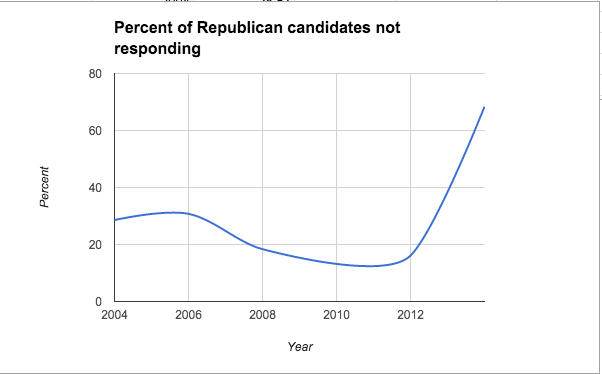The Minnesota Family Council sends a voter guide out to conservative Christian voters every two years which includes responses from candidates on a slew of issues ranging from LGBT rights, abortion, and marijuana. DFLers generally don’t respond to the questionnaire, but increasing neither are Republicans.
The Column reviewed Minnesota Family Council voter guides from 2004, 2006, 2008, 2012, and 2014 (2010 could not be located) and found that Republicans are becoming more likely to decline to answer MFC’s questions.
The voter guides count on votes from incumbent candidates to identify positions on key issues. For example, if a candidate served as a legislator and voted for marriage equality in 2013, the voter guide lists a ‘Y’ by their name. But for races where the challenger hasn’t held office in the Minnesota Legislature and there’s no vote to go by, MFC sends out a questionnaire. If those challengers don’t respond, MFC follows up with phone calls and emails.
In 2014, the voter guide asked candidates whether they would vote to: “Prohibit Abortions After 20 Weeks,” “State-wide Anti-Bullying Law,” “Legalize Same-Sex Marriage,” “Oppose Legalization of Marijuana for Medical Purposes,” “Tax Increase,” “Establish State Health Care Exchange,” “End Taxpayer Funding of Abortion,” “Unionize Private and Religious-Based Child Care Providers,” “Increase Minimum Wage,” and “Alter State Newborn Screening Program.”
Between 2004 and 2012, about 23 percent of non-incumbent Republicans declined to respond to the questionnaire. In 2012, that number was its lowest likely because a key Minnesota Family Council issue — placing a ban on same-sex marriage in the state constitution — was on the ballot. Most Republicans responded to the survey in 2012 (only 16 percent declined to respond).
In contrast, in 2014, most non-incumbent Republicans declined to respond (more than 68 percent declined to respond).
The lack of participation by Republicans in the Minnesota Family Council’s voter guide appear to confirm the narrative being pushed by mainstream media: That social issues are no longer a winner for Republicans and conservatives.
As Dave Mindeman of mnpACT wrote in September:
In Republican politics, where you stand on an issue, especially social issues, used to be vitally important. I say “used to be” because there seems to be a change in how these things are publicly addressed.
On social issues, the GOP seems to be using the “quiet little secret” method of explaining those particular positions.
In August, Minnpost’s Doug Grow noted the same in “Fall from grace: how ‘Christian values’ became a non-issue in Minnesota elections“:
Not so for the Minnesota Family Council, which is seen as a savvy player in state politics, and not lacking for piety. Its theme question for its followers this year is: “What if the followers of Jesus Christ in Minnesota reclaimed their voice in businesses, schools, entertainment and government? What if we elected godly men and women to lead us and unite our communities to advance our shared values.”
But of late, a majority of Minnesotans haven’t shared the Family Council’s values. Not only has the organization lost the marriage issue, it lost in an effort to block anti-bullying legislation earlier this year…The political losses of recent years won’t change the views of people who support the Family Council, Leva said. “These are political winds,” she said of the losses. “They don’t change values.”
But the political winds certainly have a way of changing the rhetoric.

